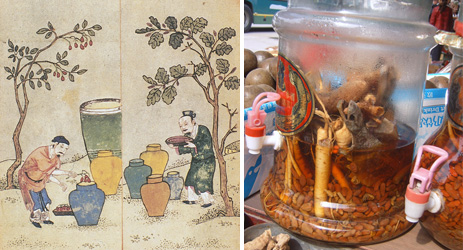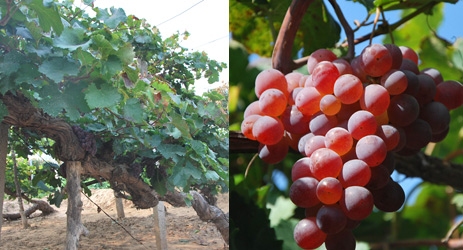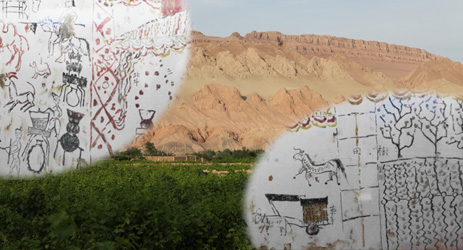Demei's View - Wine Communication from a Chinese Winemaker
Last week, I took the chance to visit Liuzhou, a beautiful industrial city in northern Guangxi Zhuang Autonomous Region, while attending the annual conference of the Fruit Wine and Medicated Liquor branch of the China Alcoholic Drinks Association (CADA). The city of Liuzhou is famous for Liu Zongyuan, a disgraced Chinese writer who was exiled from the capital to the city around 1,500 years ago. Liu was not just a great writer, but also a wise governor. His administration in Liuzhou didn’t last very long but he gained immortal fame for his sympathetic ruling measures. Whilst those who stayed in the capital, flattering the emperor, enjoyed a luxurious life they were forgotten by history. The everlasting ones are always those who connect with the general public.

This file comes from Wellcome Images, a website operated by Wellcome Trust,
a global charitable foundation based in the United Kingdom,
and adapted under Creative Commons BY 4.0 International license.
(right) Ready to drink macerated medicinal liquor with wolfberry, ginseng and other ingredients,
for sale at a traditional medicine market in Xi
‘Fruit wine and medicated liquor’ is a small category in the alcoholic drinks market.
Fruit wines (known as guojiu in Chinese) are alcoholic drinks made from all fruits except grapes. There are quite a lot of different types of fruit wines on the market, such as wolfberry wine, cherry wine, litchi wine, mulberry wine, pomegranate wine, kiwi fruit wine, five flavour berry wine and so on. Blueberry wines have become very popular in recent years as well.
Medicated liquors (known as lujiu in Chinese) are alcoholic drinks that use fermented wine, distilled spirit or edible alcohol as a base and add in edible animal and plant materials, as well as other minor ingredients and food additives to blend, mix and reprocess so that the final product changes its style from the original base. Chinese people advocate using food as medicine as there are abundant resources in China that can be used as both food and medicine there are many types of medicated liquors that can be found on the market. The typical ones are zhuyeqing liquor, ginseng and antler liquor, sanbian liquor, jin liquor, caterpillar fungus liquor and ganoderma liquor.
My main task during the conference was to give an introduction to the current situation of the Chinese alcoholic beverage market – a subject that generates sighs in the industry, especially from wine distributors and retailers. However, after taking a closer look at the world of fruit wine and medicated liquor, I found it a completely different story.
Whilst the production and sales of wine and Chinese spirit (baijiu) in China have declined since 2012, fruit wine and medicated liquor has managed to maintain a stable rate of growth.
The annual statistics of the fruit wine and medicated liquor industry
YearMain operating
income (billion)Increase (%)Total profits (billion)Increase (%)Total tax (billion)Increase (%)201116.1529.312.34365.511.23219.07201220.28231.422.48512.271.63131.63201322.86815.462.88713.761.90212.992014 (Jan - May)9.27715.400.82321.880.7548.27
Why do the performances of different types of alcoholic beverages have such huge differences in the same market? I would love to explore this question as someone working in the wine sector.
In the industry of fruit wine and medicated liquor, the latter has the majority of the market share. Most of them have some medicinal functions. There is a long history of drinking medicated liquor to build fitness and cure illness among Chinese people. Even nowadays, people who believe in traditional Chinese medicine will also approve medicated liquor. This is a drink that is easy for consumers to understand and therefore has a large audience.
Furthermore, although medicated liquor is a bit more expensive than the original base, it is generally considered an ordinary drink as opposed to a luxury.
So, the answer to the above question is actually very simple: for medicated liquor the real consumers are ordinary people, and because of this, its consumption is likely to continue steadily just like the reputation of Liu Zongyuan, for his man-of-the-people style during his administration in Liuzhou.
Translated by Nina Fan Feng / 冯帆
All rights reserved by Future plc. No part of this publication may be reproduced, distributed or transmitted in any form or by any means without the prior written permission of Decanter.
Only Official Media Partners (see About us) of DecanterChina.com may republish part of the content from the site without prior permission under strict Terms & Conditions. Contact china@decanter.com to learn about how to become an Official Media Partner of DecanterChina.com.




Comments
Submit